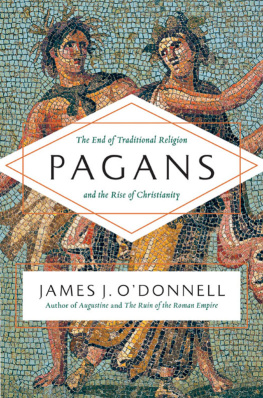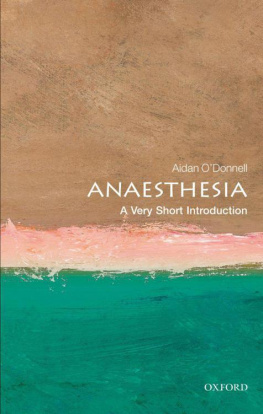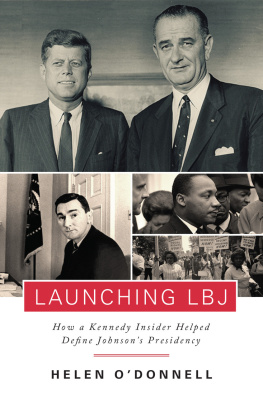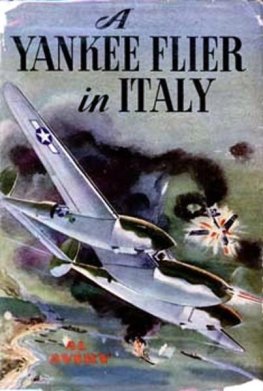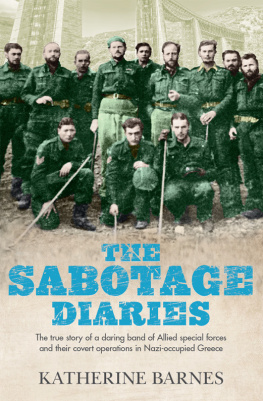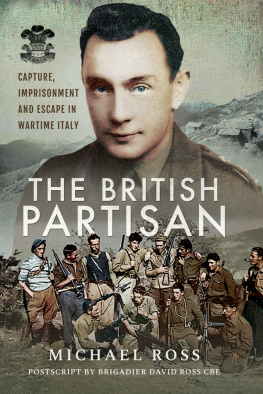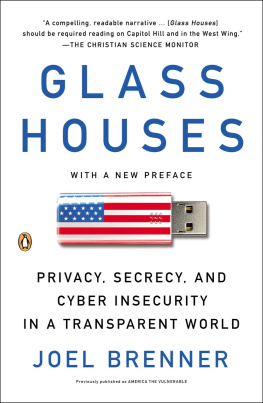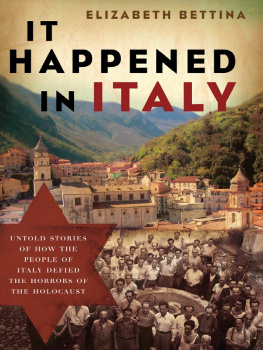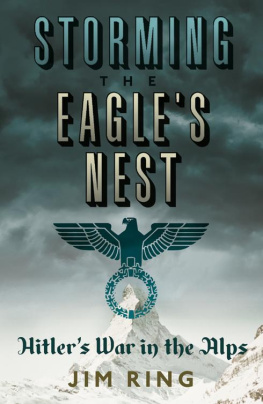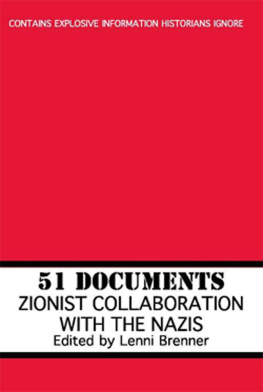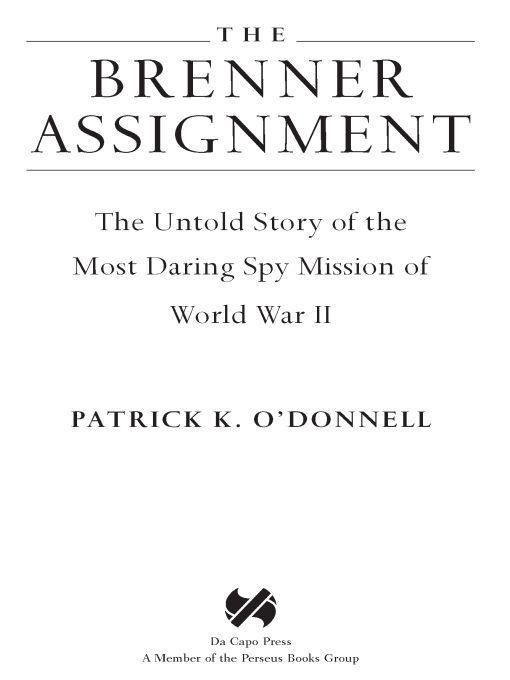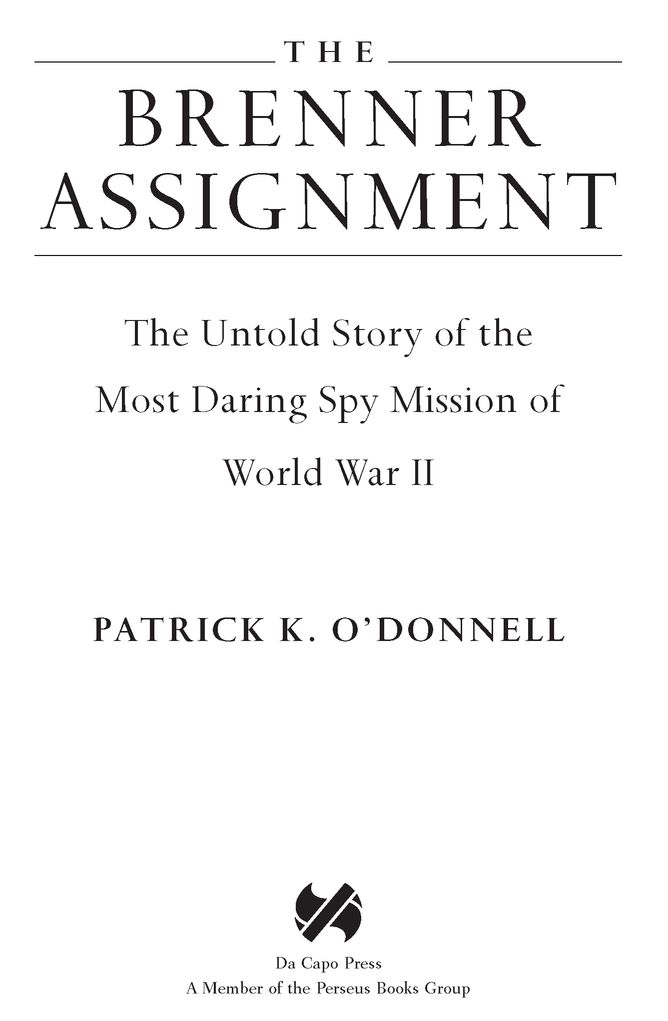Table of Contents
ALSO BY PATRICK K. ODONNELL
Beyond Valor (2001)
Into the Rising Sun (2002)
Operatives, Spies and Saboteurs (2004)
We Were One (2006)
To Stephen Hall, Howard Chappell,
and Albert The Brain Materazzi
And to my cute-osaurus, the Apple of My Eye,
and the greatest daughter in the world, Lily
PREFACE
The idea for The Brenner Assignment began nearly seven years ago, when I was looking through the dusty files of the Tacoma Missionan OSS covert mission in northern Italy near the end of World War II. At one point, I read Tacoma team leader Howard Chappells description of how he disarmed the SS soldier who had been detaining him, broke his neck, and escaped. Reading Chappells straightforward report of this episode, and yet realizing how dramatic and heroic it was, convinced me that there was a story to be told about Howard Chappell and his team. But getting Chappell to talk was a problem. For over sixty-five years, in the style of a true operative, he had remained silent about his exploits behind the lines during World War II.
After completing my previous book, We Were One: Shoulder to Shoulder with the Marines in the Battle for Fallujah, in 2006, on a long train ride from Boston to my home near Washington, D.C., I began thinking about my next book. I remembered Chappells exploits, but also knew that he probably wouldnt talk to me. On the train, I contacted a very dear friend for help: Albert Materazzi, aka the Brain, the operations officer in charge of Chappells mission. He was also Chappells best friend.
During one of our subsequent conversations, I told Materazzi that I planned on returning to Iraq to research my next project. Fearing my return to the country for a third time would be unlucky, he told me he would help convince Chappell to talk to me. Materazzi, too, was convinced the story must be told. In a very real sense, my ninety-three-year-old friend may have saved my life.
For the next two years, I spent every month in Materazzis basement, a treasure trove of thousands of secret documents outlining the covert missions he directed in World War II. Tuesdays with Morrie became, for me, Tuesdays with the Brain. Imparting a few lessons on life, he became a mentor to me and the guiding light for the book I began to write. While researching the OSS files, we broke bread countless times at numerous Italian cafs in Bethesda, Maryland; we even took a trip to Italy together in 2006 so that we could interview surviving partisans who worked with the Brains special operations teams. This was combined with years of research at the National Archives studying thousands of archives. After a few months of research at the Brains Historical Document Boot Camp, and hours of oral history-taking, I was ready for Howard Chappell.
Nevertheless, visiting the Bond-like operative, who lived in California, and convincing him to talk proved an exceptionally challenging endeavor over a seven-year period. Each telephone interview merely unearthed one tantalizing nugget at a time. Much to my dismay, the conversations would always end abruptly with Well, well talk about it one day when you come out here. Frustrated, I finally bought a plane ticket to California, without telling Chappell. Upon arriving, I picked up the phone, had a short chat, and was dismissively given his same stock response:
Well talk later when you come out here.
Howard, I am here. Can I see you tomorrow?
He paused and, much to my surprise, he agreed. I immediately called the Brain. I needed him to cement the deal. Thankfully the Brain called Chappell and strongly encouraged him to tell me his story.
Following his tour of duty, Chappell had spent the remainder of his career taking down drug kingpins and Mafia dons here at home as a narcotics agent. These experiences had embedded in him a sense of alertness and survival that did not fade with age.
Ill never forget his somewhat ornery response when I called him back:
Meet me at the gas station at Spy Glass Drive at high noon, sharp.
I arrived five minutes early, called him, and waited. A large black Lincoln Towncar with tinted windows rolled up to the vacant lot. I recognized Chappell easily. As if casing the area for threats, he peered at me from the crack of a half-opened window.
Follow me, he confidently barked from the black sedan.
Arriving at his house, we sat in the living room. For the next ten hours, Howard Chappell took me on a journey back in time to his war behind the lines. Even at ninety years of age, Chappell commanded respect, and even fear. At times, he would fiddle with his favorite wartime dagger, now relegated to the mundane duty of opening mail. Over the next few years, I had numerous other sessions with Chappell.
Thanks to the Brain, thousands of previously unseen documents were also made available to me during my years of research at the National Archives. Finally, the story began to take shape.
OSS veterans Nick Cangelosi and Charles Chuck Ciccone, who each fought behind the lines with Chappell, filled in details. Chuck graciously spent two full days along with countless hours on the telephone revealing hidden details of the mission.
During the waning days of summer 2006, I took the Brain back to Italy to meet many of the aging partisan heroes his mission worked with. I went from village to village, thanks to Roberto Testolini, whose mother fought behind the lines and whose uncle, Brownie, was part of the drama of this book. Roberto took me everywhere, taking four days out of his busy schedule to escort me to all the drop zone sites and places where OSS operative Stephen Hall and Howard Chappell fought. He also arranged many interviews with the now aging partisan warriors who fought shoulder to shoulder with Hall and Chappell. I walked and hiked large portions of Halls and Chappells battlescape, enjoying some of the best natural scenery in the world.
I would also like to thank ISBREC (Istituto Storico Bellunese della Resistenza e dellEt Contemporanea), a professional historical institute dedicated to the history of the Italian resistance, for their invaluable assistance. And I am most grateful to Carla at the Bolzano historical institute, for inviting me and Albert Materazzi to a conference on Italian covert operations.
Im indebted to two Italians: Paride Brunetti, the fearless partisan commander (known as Bruno during the war), for answering my detailed questionnaire; and Judge Guiseppe Sorge for allowing me to see some of his research, specifically his interview with the countesss housekeeper.
Ive spent over eight years researching the declassified files of the OSS at the National Archives. I would like to thank Larry McDonald and John Taylor for their archival assistance.
I would also like to thank my agent and friend, Andrew Zack, and my close friend Rajai Hakki, a hard-charging US Marine I met during the Battle of Fallujah. His editorial comments, advice, and ideas were invaluable to the manuscript. His keen sense of the story and flow helped me overcome numerous bouts of writers block. He also provided me with the morale and encouragement necessary for a long project such as this. I would also like to thank Brian Fitzpatrick for his editorial suggestions and comments. Im indebted to Madison Parker for timeless proof-reading and her keen eyes.


